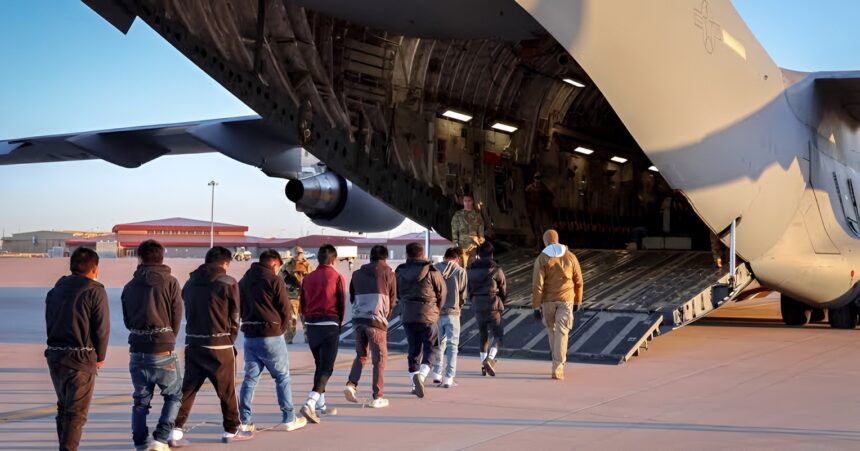A total of five migrants, including three Nigerians and two Gambians, have filed a lawsuit against the government of the United States over their deportation to Ghana.
Pan-Atlantic Kompass reports that the migrants, in the lawsuit, accused the U.S. government of allegedly violating immigration laws and of inhuman treatment during the process.
The plaintiffs, including three Nigerian nationals and two Gambians, claim the deportation to Ghana circumvented court-ordered protections against return to their home countries due to fears of persecution.
The lawsuit, filed in a Washington, DC federal court on September 13, accused the administration of U.S. President Donald Trump of enlisting Ghana as a “third country” to bypass U.S. immigration restrictions.
According to court documents, the deportees—identified only by initials D.A., T.L., I.O., D.S., and K.S. for safety—were granted “withholding of removal” status, a form of fear-based protection that prohibits direct deportation to nations where they face harm.
The plaintiffs also alleged that they were abruptly taken from a detention centre in Alexandria, Louisiana, in the early hours of September 5 without being told their destination. They were later flown on a U.S. military cargo plane, where they claim they were shackled and provided only bread and water during the 16-hour journey.
According to their lawyers, the deportation violated standing immigration court protections that barred their return to their home countries on fear-based grounds.
The filing stated: “Defendants know that they may not, consistent with U.S. immigration law, directly deport non-citizens to countries from which they have been granted fear-based protection. As an end-run around this prohibition, defendants have enlisted the government of Ghana to do their dirty work.”
It was also gathered that during an emergency hearing on September 12, U.S. District Judge Tanya Chutkan criticized the U.S. government’s actions, calling them “truly disingenuous.”
The judge questioned how the administration could claim compliance while allowing Ghanaian officials to prepare the migrants for return to their origins, despite knowing the risks.
“You send them to Ghana, and you say, ‘Oh, but Ghana says they’re not going to send them home.’ And Ghana immediately prepares to send them home with what appears to be your full awareness. How is this not a violation of your obligation?” Chutkan remarked, as reported in court proceedings.
Pan-Atlantic Kompass reports that the lawsuit came after Ghana’s President, John Dramani Mahama confirmed that his country had reached an agreement with the U.S. government to receive 14 deportees and assist in returning some to their countries of origin.
Mahama had said: “We were approached by the US to accept third-party nationals who were being removed from the US, and we agreed with them that West African nationals were acceptable because all our fellow West Africans don’t need a visa to come to our country.”
He justified the deportation to Ghana by saying West Africans “don’t need a visa anyway” to come to the country.
Meanwhile, reacting to the deportation of Nigerians to Ghana, the Ministry of Foreign Affairs, Kimiebi Ebienfa, told the press that: “We have yet to be informed officially.”
Commenting on the deportation to Ghana, retired Ambassador Rasheed Akinkuolie said the decision to receive Nigerian deportees falls within Ghana’s sovereign rights.
“The government of Ghana has the right to accept deportees from the USA. It is an internal affair of the country, and the reasons for taking such a decision cannot be questioned by another country. What Ghana will do with the deportees is left for the country to sort out,” Akinkuolie said.
Also, another retired diplomat, Ambassador Ogbole Amedu-Ode, who reacted to the development said the move appeared to be driven by logistics rather than any bilateral agreement with Nigeria.
“Ghana is accepting US deportees of West African extraction. This is at the instance of the U. S. Recall that Nigeria had earlier rejected a US request for the same purpose, albeit, deportees of Venezuelan extraction,” Amedu-Ode said.
He explained that Ghana’s decision may be tied to the fact that citizens of ECOWAS countries do not require visas to enter Ghana.
“Ghana’s reason for accepting these migrants is that, being citizens of West African countries, they’d not require visas to enter Ghana en route to their countries of origin,” he added.
Another Retired Nigerian Ambassador, Mohammed Mabdul, noted that while the move may reduce short-term pressure on other host countries, it could also complicate Nigeria-Ghana relations if not handled diplomatically.
“We’ve had disputes in the past, especially around the treatment of Nigerian traders in Ghana. Deportation issues must be managed carefully to avoid reigniting tensions.
“As long as deportation is done through proper channels and with verified information, there is no issue. But when countries like the US act unilaterally, without consultation or due process, it creates serious diplomatic challenges,” he said.





